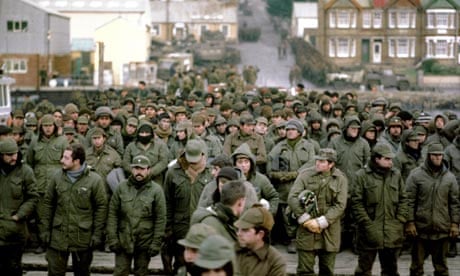A ceasefire was agreed in the Falklands last night after British troops had fought their way into the outskirts of the capital, Port Stanley. The Prime Minister told the House of Commons that white flags were flying over the town, and that the Argentinian defenders had thrown down their weapons.
At the Ministry of Defence, officials were more circumspect. British troops had been ordered to stand fast overnight, they said, because it was impossible to move into the town in darkness without risk of further clashes. But there was every expectation that at first light, the British would resume their advance and disarm the defending garrison.
For the moment, it was true that the Argentinians had "surrendered," but not necessarily without conditions. Negotiations would resume at daybreak, said the ministry.
Initial contact between the opposing forces' headquarters was made by radio at 6pm. A ceasefire was then ordered. The two commanders General Mario Menendez and the British second-in-command, Brigadier John Walters, met at Moody Brook, the former Marines barracks with an interpreter.
The Ministry of Defence in London was kept in touch with the progress of negotiations at five-minute intervals through an open telephone line routed through Northwood, Middlesex.
Although no formal agreement was signed, and reports from Buenos Aires suggested that the ceasefire might last only until 10am this morning local time if the British surrender terms were unsatisfactory, defence officials in London were confident that the fighting was over.
Their priorities in this morning's negotiations would be to stop the fighting throughout the Falklands, including West Falkland, where an Argentinian garrison of up to 2,000 men is still intact, to separate the defenders from their arms, and to secure the safety of all civilians.
There is no question of the Argentinians leaving the islands with their weapons. These would be handed over to the British troops. The aim would be to ship the Argentinian soldiers out in a very short time.
Whatever terms the British have offered, the Argentinians have little real option but to accept them. Throughout the day communiques issued in Buenos Aires had prepared Argentina for the inevitable defeat.
In London Mrs Thatcher told jubilant MPs last night: "After successful attacks General Jeremy Moore decided to press forward and the Argentines retreated. As our forces reached the outskirts of Port Stanley large numbers of Argentine soldiers threw down their weapons. They are reported to be flying the white flag over Port Stanley.
"Our troops have been ordered not to fire except in self defence. Talks are now in progress about a surrender of the Argentine forces on the East and West Falklands."
The Prime Minister's statement was followed by loud cheers and waving of order papers.
The Defence Secretary, Mr John Nott, said later he assumed the Union Jack would be flying over Port Stanley within a few hours. "We have still got to get the final details worked out but it looks very good." Asked if the war was over, he said, "It looks like it."
This followed the news that the defenders had been seen "streaming back into Port Stanley" as the British forces captured three of the four remaining hills to the west of the capital, and began their final advance into the town.
By the time Mr Nott gave this news, at about noon Falklands time, the leading British troops were within sight of Government House, at the western end of the Stanley waterfront, from which the governor Mr Rex Hunt was forcibly evicted two months ago.
There will be no inclination among the British soldiery to accept anything but an unconditional surrender - particularly after the casualties they have suffered - although even at this stage diplomatic pressure may force Mrs Thatcher's Government to give the Argentinians some way out.
Earlier reports from Buenos Aires yesterday suggested that President Galtieri had authorised General Menendez to give in, provided it was compatible with his idea of military honour.
The assault on Port Stanley began before dawn on Friday, when a first push carried the British up on to the Two Sisters ridge, on to Mount Harriet and Mount Longdon. It was the last of these that saw the heaviest fighting, and accounted for most of the estimated 50 Argentinian dead. Fatal British casualties in this first phase of the attack were less than half that number, although many more were wounded. By yesterday afternoon, "some hundreds" of Argentinian prisoners had already been taken.
For some time the authorities have been selling the idea that if Argentina is defeated it will be because it is up against not only Britain but the industrial West.
The high command's communiques yesterday began to emphasise that Argentina's troops defending Port Stanley faced an enemy superior in numbers and weaponry.
The Argentine people first began to know that the situation was serious when the communiques started to interrupt television coverage of the World Cup.
